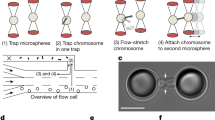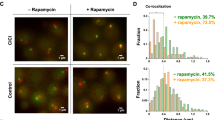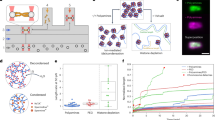Abstract
RECENT observations in this laboratory1,2 have indicated a wide and unusual spectrum of effects which can be obtained from a radio-frequency source in the megacycle range. In order to minimize dielectric heating, it was necessary to reduce the mean power input and therefore we have used a pulsed radio-frequency source at 27 Mc./s. The pulses are of the order of 5 × 10−5 sec. Most of the effects described herein are produced with between 80 and 180 pulses per sec.
This is a preview of subscription content, access via your institution
Access options
Subscribe to this journal
Receive 51 print issues and online access
$199.00 per year
only $3.90 per issue
Buy this article
- Purchase on SpringerLink
- Instant access to full article PDF
Prices may be subject to local taxes which are calculated during checkout
Similar content being viewed by others
References
Heller, J. H., and Cutler, J. L., Proc. Third Internat. Symp. Reticulo-endothelial System (Ronald Press, New York City; in the press).
Heller, J. H., Teixeira-Pinto, A., and Cutler, J. L., Res. Bull. (in the press).
Author information
Authors and Affiliations
Rights and permissions
About this article
Cite this article
HELLER, J., TEIXEIRA-PINTO, A. A New Physical Method of creating Chromosomal Aberrations. Nature 183, 905–906 (1959). https://doi.org/10.1038/183905a0
Issue Date:
DOI: https://doi.org/10.1038/183905a0
This article is cited by
-
Acceleration of the development of benzopyrene-induced skin cancer in mice by microwave radiation
Archives of Dermatological Research (1982)
-
Effects of 9.4 GHz microwave exposure on meiosis in mice
Experientia (1979)
-
Effects of high frequency electric fields on mammalian chromosomes in vitro
Journal of Biological Physics (1978)
-
Coacervate Behaviour in an Alternating Electric Field
Nature (1966)
Comments
By submitting a comment you agree to abide by our Terms and Community Guidelines. If you find something abusive or that does not comply with our terms or guidelines please flag it as inappropriate.



